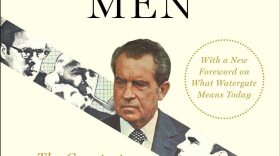
Ron Elving
Ron Elving is Senior Editor and Correspondent on the Washington Desk for NPR News, where he is frequently heard as a news analyst and writes regularly for NPR.org.
He is also a professorial lecturer and Executive in Residence in the School of Public Affairs at American University, where he has also taught in the School of Communication. In 2016, he was honored with the University Faculty Award for Outstanding Teaching in an Adjunct Appointment. He has also taught at George Mason and Georgetown.
He was previously the political editor for USA Today and for Congressional Quarterly. He has been published by the Brookings Institution and the American Political Science Association. He has contributed chapters on Obama and the media and on the media role in Congress to the academic studies Obama in Office 2011, and Rivals for Power, 2013. Ron's earlier book, Conflict and Compromise: How Congress Makes the Law, was published by Simon & Schuster and is also a Touchstone paperback.
During his tenure as manager of NPR's Washington desk from 1999 to 2014, the desk's reporters were awarded every major recognition available in radio journalism, including the Dirksen Award for Congressional Reporting and the Edward R. Murrow Award from the Corporation for Public Broadcasting. In 2008, the American Political Science Association awarded NPR the Carey McWilliams Award "in recognition of a major contribution to the understanding of political science."
Ron came to Washington in 1984 as a Congressional Fellow with the American Political Science Association and worked for two years as a staff member in the House and Senate. Previously, he had been state capital bureau chief for The Milwaukee Journal.
He received his bachelor's degree from Stanford University and master's degrees from the University of Chicago and the University of California – Berkeley.
-
50 years on, the authors profess amazement that another president came along willing to jettison whatever conscience he had, and whatever respect for the rule of law, in an effort to stay in office.
-
Fifty years from now, when Americans look back on the riotous break-in at the Capitol on Jan. 6, 2021, will it have as much impact as memories of the Watergate scandal continue to have today?
-
The populist energy within the Republican Party goes by the name the former president gave it: MAGA. And its influence on the 2022 midterms seems destined to track that of the Tea Party surge in 2010.
-
The question arises: Since when did so much of our politics have to do with religion? And the answer is, since the beginning — and even before.
-
The concept and practice of the U.S. government deciding what to recognize as a genocide is profoundly political, both in contemporary and historical cases.
-
Responsibility is difficult to prove conclusively in a war zone, and evidence might have to link such acts to national leaders far from the battlefield. But it has happened.
-
Biden was far from the first U.S. president to say what he thought about Russia or its leaders — or to pay a price for it.
-
Other addresses to Congress by foreign leaders have paled compared to Winston Churchill welding with his words the alliance that overcame Adolph Hitler, until Volodymyr Zelenskyy's this week.
-
American gas stations displaying high prices this summer and fall will matter more than all the campaign billboards put together in affecting the November midterm elections.
-
There's no law against making laws in an election year. There are special challenges, but the hurdles may loom larger in lore than in reality.








